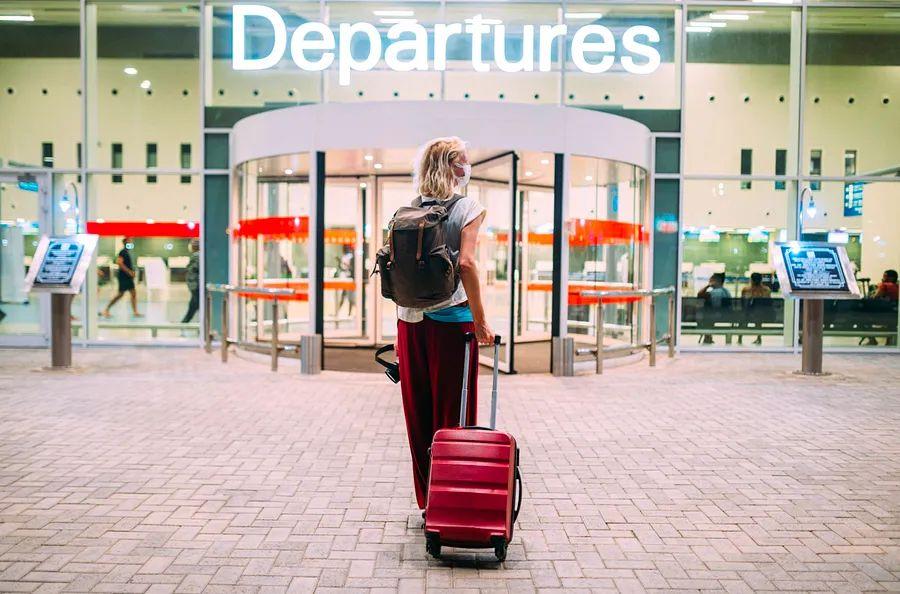Carry-on versus checked luggage: Which option is best?

It’s often the biggest dilemma for travelers: Do you choose carry-on or checked bags?
Many seasoned travelers are devoted to using only a carry-on, while others prefer the convenience of checking a bag. Some travelers decide based on the specifics of each trip; a quick business jaunt may call for just a carry-on, but a two-week cruise in Europe might require a checked suitcase.
If you don’t firmly identify with Team Carry-on or Team Checked Luggage, here are some considerations to help you decide between a carry-on and a checked bag for your next journey.
Airline baggage fees
If you're aiming to save money, carry-on bags are the way to go, as most airlines permit one free carry-on and a personal item. Meanwhile, most airlines impose a checked bag fee, generally starting around $30 or $35 for the first checked bag on domestic flights, with higher fees for extra bags.
That said, don't make broad assumptions about baggage fees when deciding whether to check your suitcase or bring it on board. Budget airlines like Spirit and Frontier do charge for carry-on bags. If you purchase a basic economy fare on United Airlines, you’ll also need to pay for your rollaboard.
On the other hand, you may qualify for complimentary checked bags if you have elite status with the airline you're flying or if you hold a cobranded airline credit card. Depending on your status, you might also be able to get free bags for some or all of your travel companions. Additionally, premium seating options such as business or first class often include one or two free checked bags.
Effortless travel
 HINTERHAUS PRODUCTIONS/GETTY IMAGES
HINTERHAUS PRODUCTIONS/GETTY IMAGESWhether you choose to check or carry on your luggage, both options can lead to a smooth travel experience, depending on what annoys you more.
If you're pressed for time or dislike waiting in lines or at the baggage claim, carrying on your luggage is the way to go. At your departure airport, you won't need to stand in line to check your bag, and upon arrival at your destination, you can simply walk off the plane and head straight to your transport—bypassing the long wait at the baggage carousel.
On the other hand, if you prefer to navigate the airport without a suitcase, consider checking your bag. This way, you can move through the terminal with ease, fit into tight bathroom stalls, or squeeze into a restaurant booth without the hassle of a rollaboard. Traveling with fewer items also gives you extra room to relax once you're on the plane.
Potential for loss or damage
Lost luggage can be a significant downer on any journey. For instance, my husband had to attend a job interview in jeans after the airline misplaced his bags, and he ended up buying new clothes for our rehearsal dinner. I've seen distraught travelers on cruise ships sneak into formal dinners in their travel outfits because their luggage was nowhere to be found.
To completely eliminate the risk of lost luggage, opt for a carry-on bag. Once your suitcase is out of your hands, its fate is uncertain—will you ever see it again?
The viral video "United Breaks Guitars" highlighted that baggage handlers might not treat your items with the care you expect. From suitcases to musical instruments, belongings can be roughly handled during transit. If you're concerned about the potential damage to your luggage, prioritize carry-ons whenever possible.
Essential items to include in your packing list.
 Image credit: GHISLAIN AND MARIE DAVID DE LOSSY/GETTY IMAGES
Image credit: GHISLAIN AND MARIE DAVID DE LOSSY/GETTY IMAGESCarrying a large suitcase on board is generally not an option, so sometimes the amount of gear you intend to take will dictate whether you choose to check a bag or not. For a short two-day business trip, for instance, a small rollaboard plus a laptop bag should suffice, making a checked bag feel unnecessary.
If you're embarking on a two-week journey to Antarctica and require a variety of cold-weather clothing, cramming everything into a carry-on may not be feasible. In such cases, checking a bag becomes a necessity.
I typically check a bag because fitting all my liquids into a small quart-sized bag is a challenge. When you need to bring full-size bottles of toiletries or makeup, checking your suitcase is unavoidable. The same goes for traveling with bulky sports gear or items that can’t be taken on board—you'll need to budget for those checked bag fees.
If you're a dedicated shopper, be ready to check a bag for your return trip to make room for all those delightful souvenirs.
Cabin space
Remember to take into account the available space on board, both for yourself and your luggage, when deciding whether to check or carry your bags.
Without elite status, the appropriate credit card, or an early boarding group on a full flight, you may find yourself needing to gate-check your rollaboard whether you like it or not. If you're prone to anxiety, you might prefer the peace of mind that comes from checking your suitcase ahead of time, rather than risking overhead bin space. It can be disheartening to pack thoughtfully into a smaller bag only to be forced to check it.
Think about how much personal space you require during your flight, particularly in a tight coach seat. Shorter travelers might find it manageable to have a bag at their feet, while taller passengers, who may already have their knees pressing against the seat in front, could use that extra floor space.
Travelers in business or first class will generally find it easier to bring larger bags on board, thanks to fewer passengers competing for overhead space and simply more room for luggage and legroom.
Additional factors to consider
 Image credit: ZIA SOLEIL/GETTY IMAGES
Image credit: ZIA SOLEIL/GETTY IMAGESFor travelers with physical challenges, checking a bag can be a practical choice, especially if navigating long airport corridors while dragging a suitcase is cumbersome, or if it's simpler to carry just a backpack while being assisted in a wheelchair.
Similarly, families traveling with children might opt to check their bags when they’re already managing strollers and holding babies in the airport. If you plan to check a car seat or stroller instead of bringing them on board or gate-checking, you'll have to wait in the baggage check line anyway, so skipping the suitcase check won’t save you time.
Conversely, those flying standby should keep all their belongings with them to avoid being on a flight that leaves hours before their checked luggage. On international flights, having checked bags may even prevent you from flying standby altogether.
Key takeaways
Deciding whether to carry on or check your luggage for any trip is a personal choice. However, if you're looking for a guideline, here’s how we view the carry-on versus checked-bag dilemma.
Bring your bags on board for quick trips, when minimizing time spent at airports is essential, and when avoiding checked bag fees is a priority.
Opt to check your bags when you need more space in your suitcase or around your seating area on the plane, if checking your suitcase is complimentary, or when the burden of hauling a rollaboard through the airport becomes too cumbersome.

1

2

3

4

5
Evaluation :
5/5